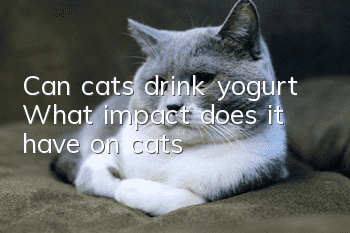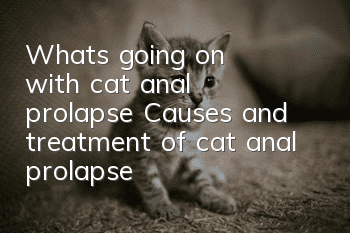Can cats drink yogurt? What impact does it have on cats?

Generally speaking, it is not recommended to give yogurt to cats, because I have a cat at home, and I gave him yogurt for a while, but during that time it had diarrhea. Owners who have raised cats all know that cats cannot eat dairy products. If they eat dairy products, they will definitely suffer from diarrhea. If the owners think it is okay and feed their cats, diarrhea will not be good.
Let me introduce to you whether cats can eat dairy products, what symptoms will occur, and what foods will have worse effects if cats eat them.
Some netizens believe that cats cannot drink yogurt because yogurt can stimulate the gastrointestinal tract and kittens will have diarrhea if they eat it, which is a serious threat to the cat’s health.
Some netizens believe that it is best not to give cats milk or yogurt because their body structures are completely different from those of humans. Food suitable for humans may not necessarily be suitable for cats.
However, some netizens believe that the lactose in yogurt has been decomposed, so even cats with lactose intolerance should be fine if they drink yogurt. Therefore, some cats drinking a little yogurt in life will not have much impact. However, it is worth noting that different individual cats also have physical differences. Moreover, scientifically speaking, do not give yogurt to cats casually. Of course, if the cat has constipation, there will be no problem if you try to give it a little.
Cat nutritionists tell us that cats can get the water their bodies need and part of the calories from carbohydrates from other foods; but cats cannot survive on milk alone! Even most cats (especially All kittens are lactose intolerant. They do not have the enzyme lactase, so they cannot digest the lactose in milk. Therefore, they will have soft stools or diarrhea a few hours after drinking milk (or yogurt). If diarrhea occurs, the intestines are unable to fully absorb water and nutrients. If your cat has a similar situation, stop feeding milk or yogurt immediately.
There is also the theobromine contained in chocolate, which is a central nervous system stimulant. Cats eating too much chocolate will cause poisoning symptoms, but it depends on the level of theobromine content, the amount eaten, and the weight of the pet itself. , usually appears:
1. Loss of appetite, salivation, vomiting, and diarrhea.
2. Frequent urination—Because theobromine has a diuretic effect, pets will urinate frequently, which can be used as a diagnostic tool.broken indicator.
3. Central nervous system excitement, restlessness, trembling, unsteady steps, cramps, and severe coma.
4. Rapid heartbeat, rapid breathing, irregular heartbeat, and in severe cases, heart failure leading to death.
Symptoms will generally occur 2-4 hours after cats eat chocolate products, and in severe cases, they will die within 1-2 days. If consumed in small amounts in batches for several days, theobromine will accumulate in the body, making it difficult to excrete it, causing chronic heart failure and death.
If you love a cat, you should think about it and strictly select the pet's food. You may not feel free to share the food with your pet if you think it is delicious. You originally love it, but unfortunately, if the "poison" comes from the mouth, it will turn into poison. Because of the poisoning incident, it violates the original intention of love. It is best to feed pets their own food, such as feed and canned food. If you want to feed your pets snacks, there are many pet-specific snacks to choose from.
Another reminder is that cats and dogs should not drink tea, coffee, or eat foods containing tea and caffeine. Caffeine in coffee, theophylline in tea, and theobromine in chocolate all contain methylxanthines, which can cause poisoning in pets.
- What are some ways to choose cat food for Persian cats?
- Can pet cats be brought on the high-speed train?
- What happens if a cat is deficient in vitamins?
- How does the wound of a male cat heal after being neutered?
- What are the breed types of bobtail cats?
- How to feed a one and a half month old cat
- Introduction to some common diseases of cats
- Should a one month old kitten drink water?
- How to train a cat to understand the "come here" command? Cat training!
- First aid method for cat shock, a must-have for families!



